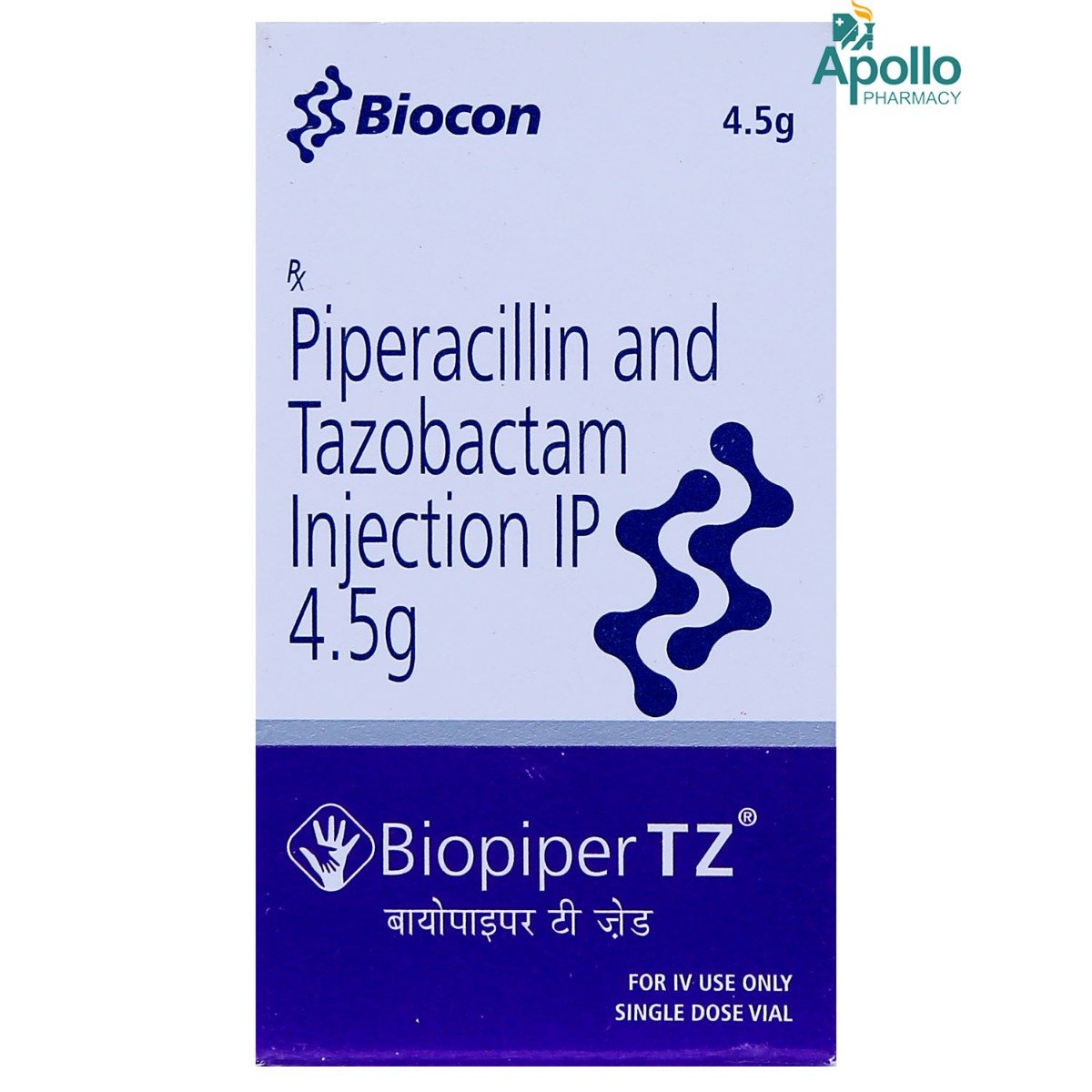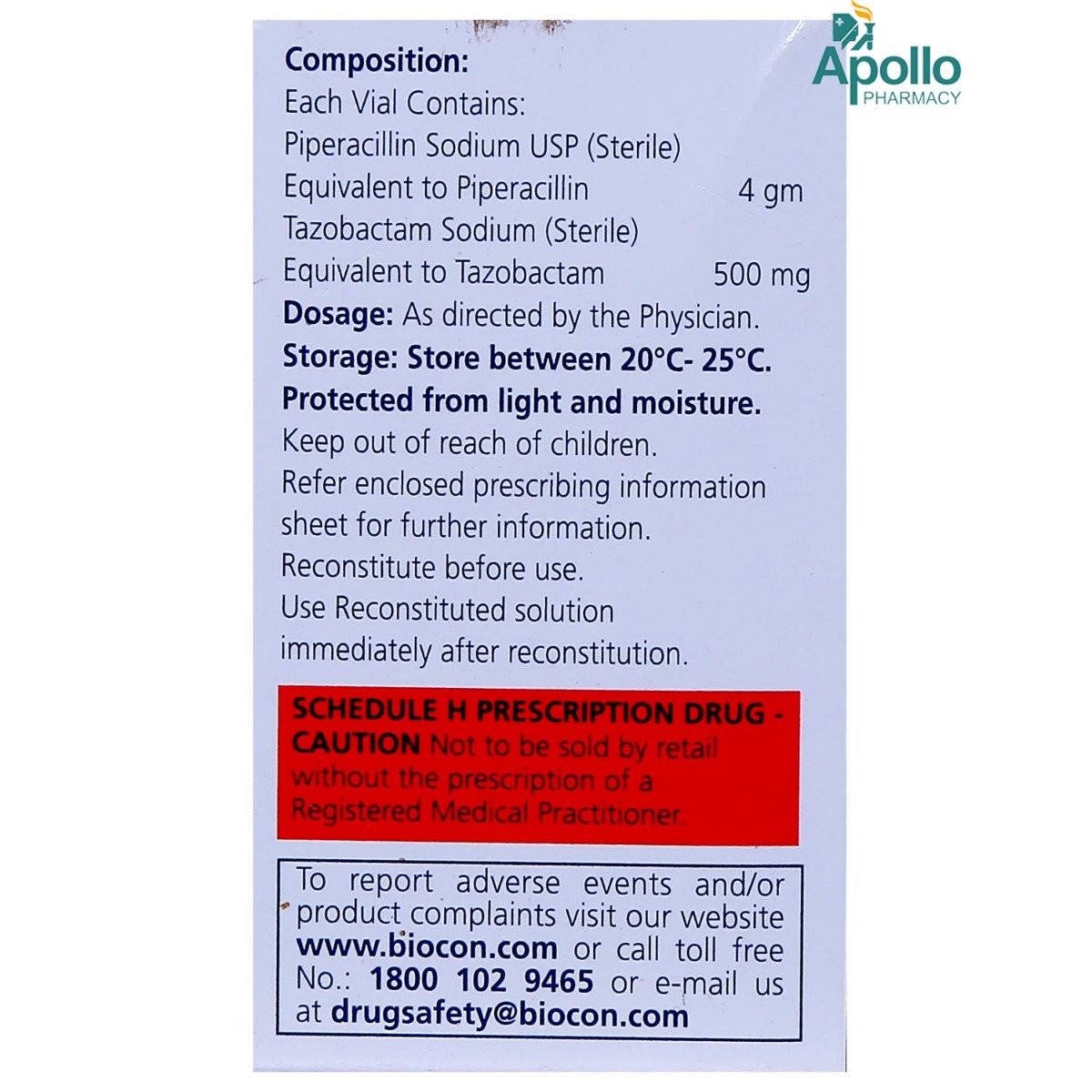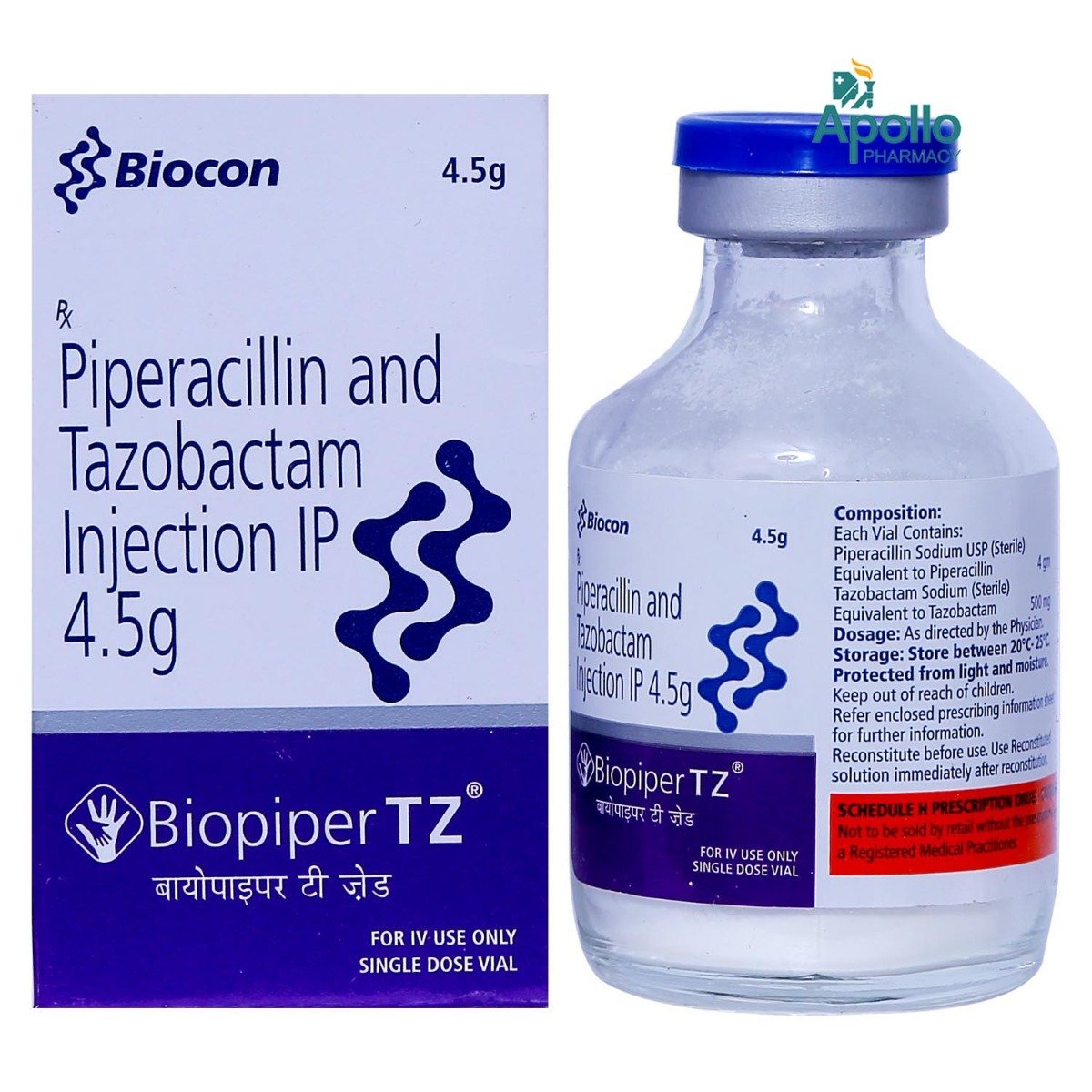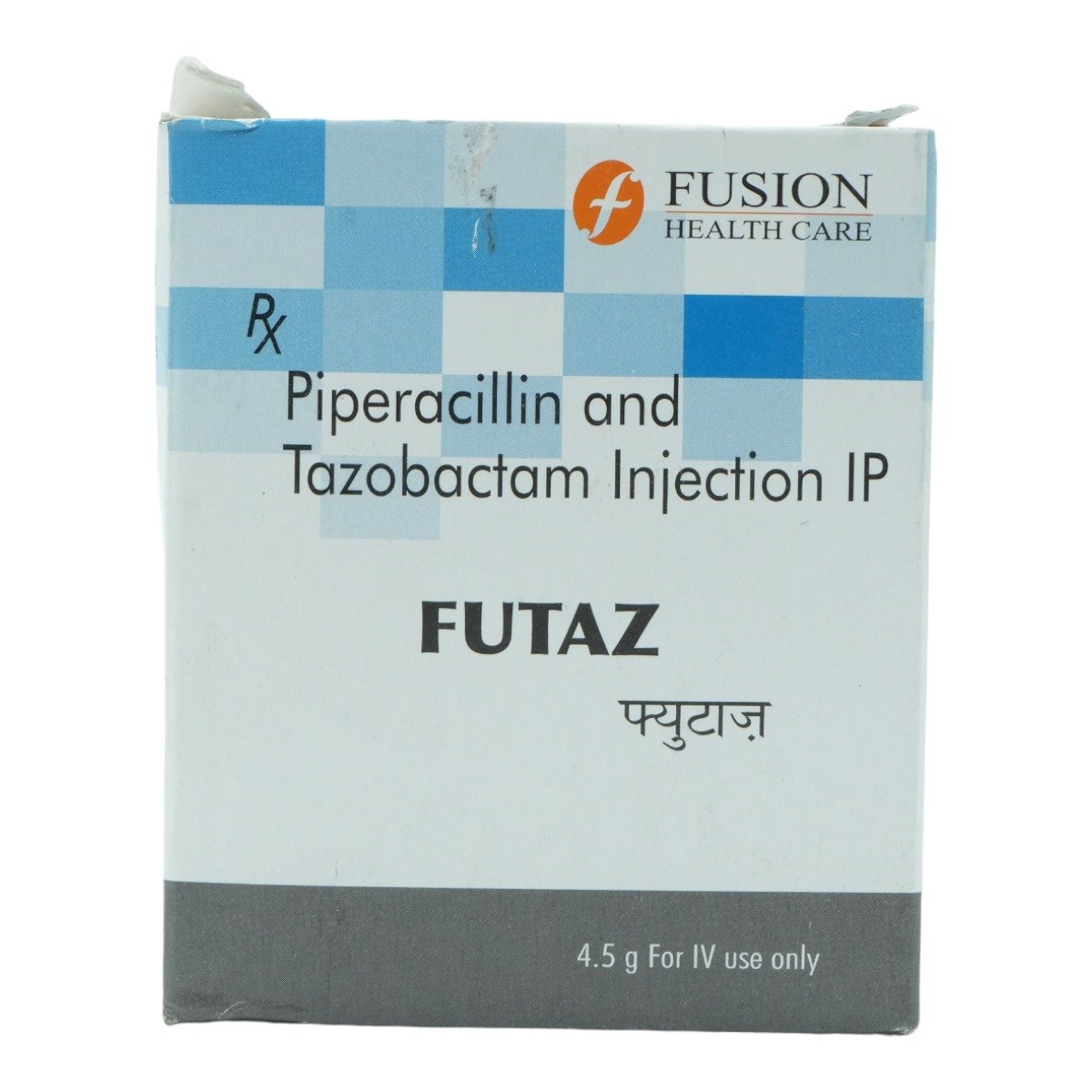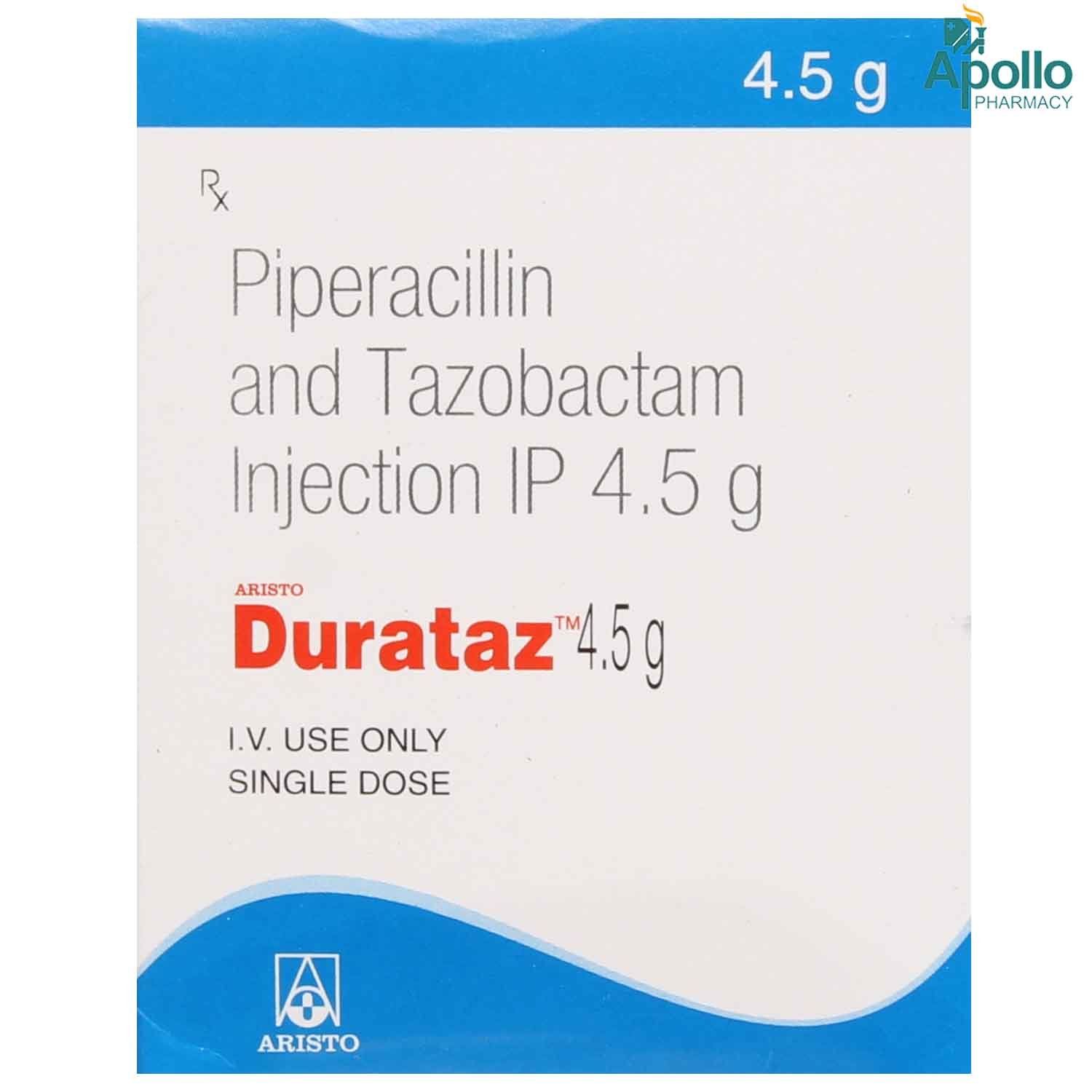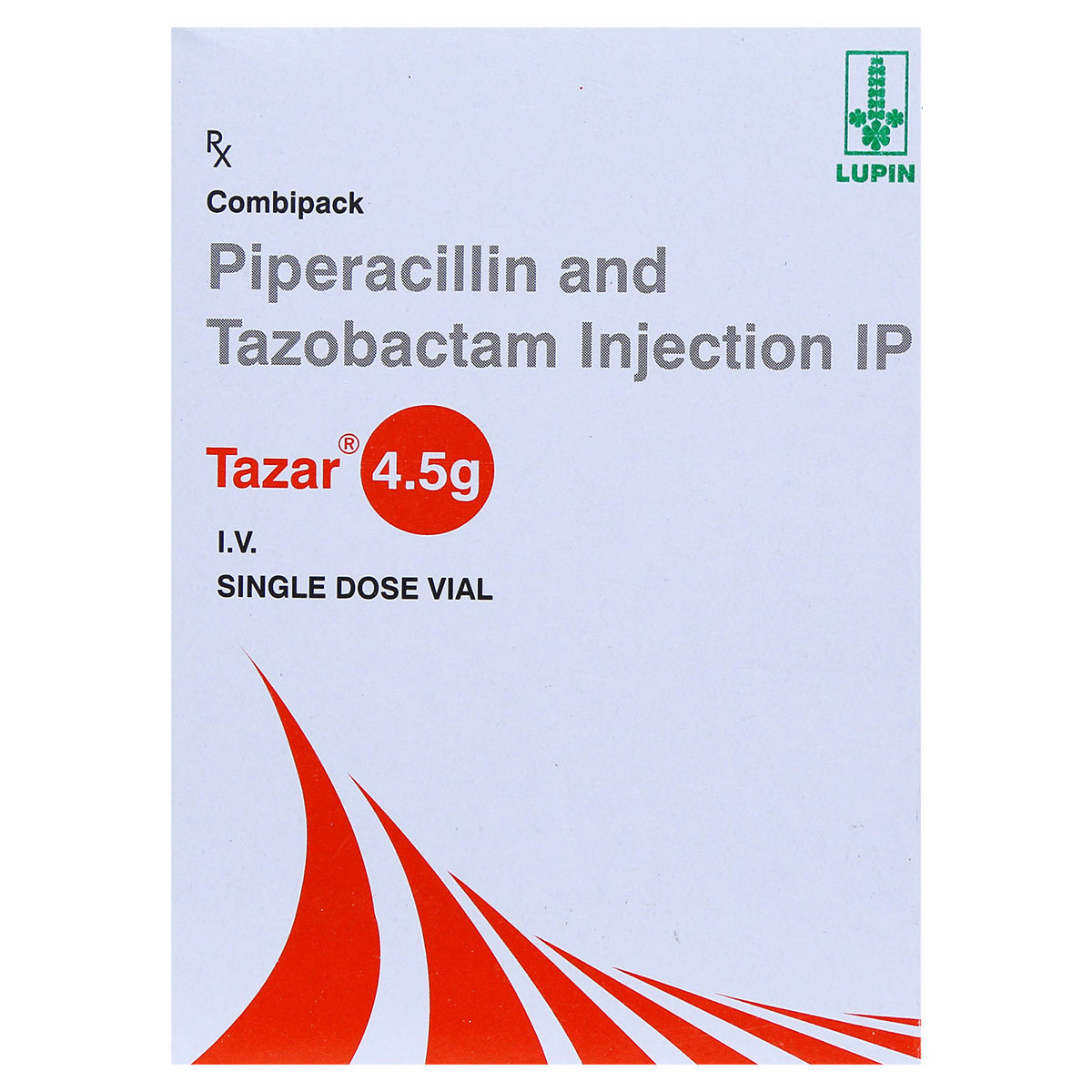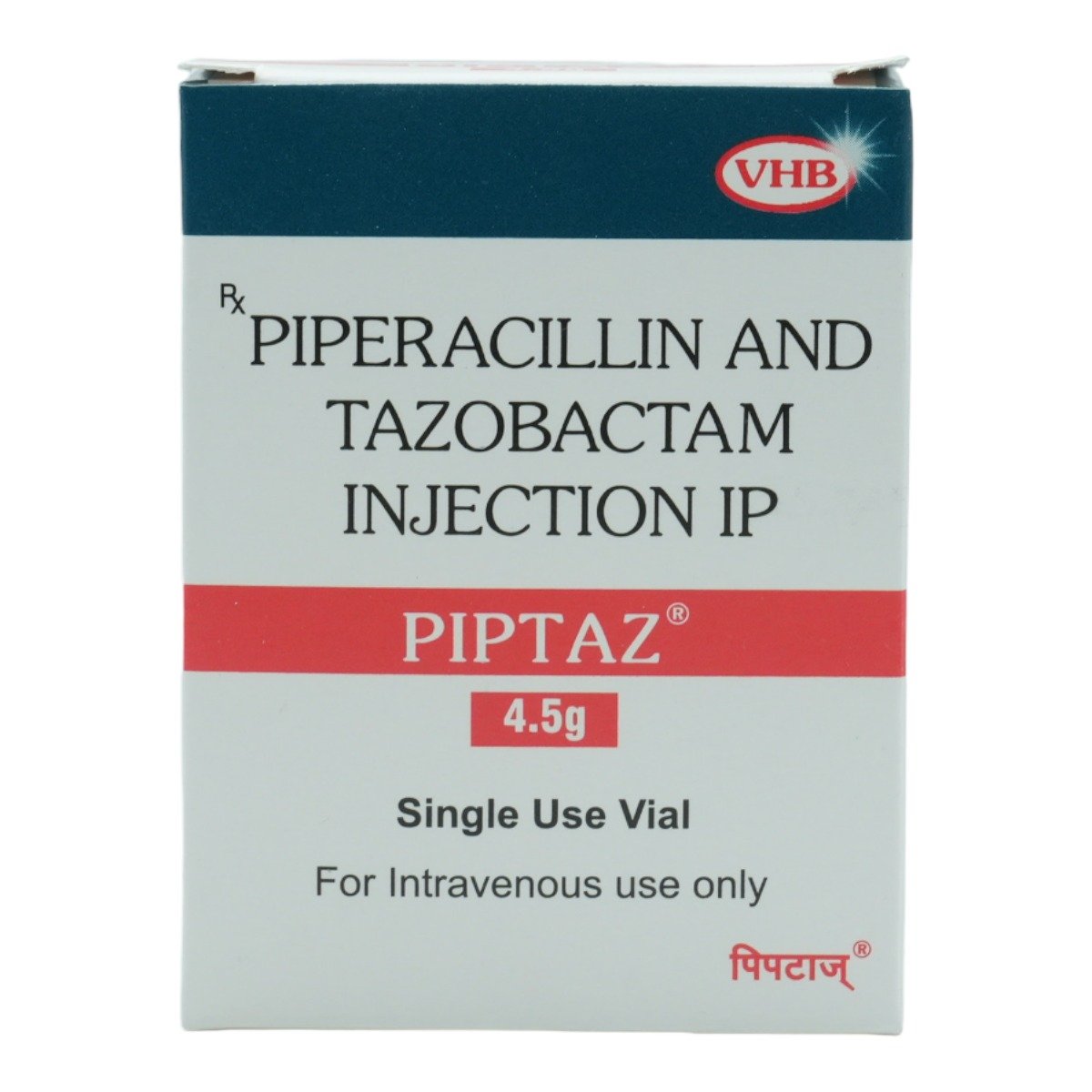Biopiper TZ Injection 4.5 gm
MRP ₹419
(Inclusive of all Taxes)
₹62.9 Cashback (15%)
Provide Delivery Location
Online payment accepted
 Prescription drug
Prescription drugWhats That
Composition :
Manufacturer/Marketer :
Consume Type :
Expires on or after :
Return Policy :
NPPA :
About Biopiper TZ Injection
Biopiper TZ Injection belongs to the 'Antibiotics' class of drugs, primarily used to treat bacterial infections. It is used to treat various hospital-acquired and ventilator-associated pneumonia, urinary tract infections, intra-abdominal infections, skin and soft tissue infections (like diabetic foot infections) and uterine infections. Bacterial infection occurs when harmful bacteria grow in the body and causes illness. It can infect any part of the body and multiply very quickly.
Biopiper TZ Injection contains two medicines, namely: Piperacillin (Penicillin antibiotic) and Tazobactam (beta-lactamase inhibitor). Piperacillin belongs to the class of 'Penicillin antibiotics.' It has bactericidal (ability to kill bacteria) activity against gram-positive and gram-negative aerobic (requires oxygen to survive) and anaerobic (survives with little or no oxygen) bacteria. Piperacillin acts by binding to the penicillin-binding proteins (PBPs) inside the bacterial cell wall and inhibits its cell wall synthesis. Tazobactam is a beta-lactamase inhibitor. Beta-lactamases are the enzymes produced by bacteria to gain multi-resistance to β-lactam antibiotics, such as penicillins and cephalosporins. Tazobactam prevents the breakdown of other antibiotics by beta-lactamase enzyme-producing organisms. In Biopiper TZ Injection , Tazobactam works by preventing bacteria from destroying Piperacillin.
Biopiper TZ Injection will be administered by a healthcare professional. Like all medicines, Biopiper TZ Injection also causes side effects, although not everybody gets them. Common side effects of Biopiper TZ Injection include nausea, constipation, diarrhoea, headache, and trouble sleeping. If any of these effects persist or worsen, seek medical advice promptly.
Brief your medical history to the doctor if you have any allergic reactions to antibiotics. Please inform your doctor if you have any liver, kidney diseases, bleeding disorders, and fits before using Biopiper TZ Injection . Do not use Biopiper TZ Injection while having vaccinations with live bacterial vaccines (typhoid vaccine) since Biopiper TZ Injection may affect vaccines' activity. Biopiper TZ Injection should be used during pregnancy only if the doctor advises you. It is also excreted into breast milk in small amounts. Hence, it is recommended to consult your doctor if you are pregnant or breastfeeding before taking Biopiper TZ Injection .
Uses of Biopiper TZ Injection
Directions for Use
Key Benefits
Biopiper TZ Injection contains two medicines, namely: Piperacillin and Tazobactam. Piperacillin is a Penicillin antibiotic. It acts by binding to the penicillin-binding proteins (PBPs) inside the bacterial cell wall and inhibits its cell wall synthesis. Tazobactam is a beta-lactamase inhibitor that prevents the breakdown of other antibiotics by beta-lactamase enzyme-producing organisms. In Biopiper TZ Injection , Tazobactam works by preventing bacteria from destroying Piperacillin. Thus, Biopiper TZ Injection helps treat various bacterial infections of the stomach, lungs, skin and uterus.
Storage
- Inform Your Doctor: Notify your doctor immediately about your diarrhoea symptoms. This allows them to adjust your medication or provide guidance on managing side effects.
- Stay Hydrated: Drink plenty of fluids to replace lost water and electrolytes. Choose water, clear broth, and electrolyte-rich drinks. Avoid carbonated or caffeinated beverages to effectively rehydrate your body.
- Follow a Bland Diet: Eat easy-to-digest foods to help firm up your stool and settle your stomach. Try incorporating bananas, rice, applesauce, toast, plain crackers, and boiled vegetables into your diet.
- Avoid Trigger Foods: Steer clear of foods that can worsen diarrhoea, such as spicy, fatty, or greasy foods, high-fibre foods, and dairy products (especially if you're lactose intolerant).
- Practice Good Hygiene: Maintain good hygiene to prevent the spread of infection. To stay healthy, wash your hands frequently, clean and disinfect surfaces regularly, and avoid exchanging personal belongings with others.
- Take Anti-Diarrheal Medications: If your doctor advises, anti-diarrheal medications such as loperamide might help manage diarrhoea symptoms. Always follow your doctor's directions.
- Keep track of your diarrhoea symptoms. If they don't get better or worse or are accompanied by severe stomach pain, blood, or dehydration signs (like extreme thirst or dark urine), seek medical help.
- Inform your doctor about your constipation symptoms. They may adjust your medication or advise alternative treatments.
- Stay hydrated by drinking sufficient of water (at least 8-10 glasses a day) to help soften stool and promote bowel movements.
- Increase fibre intake by eating foods high in fibre, such as fruits, whole grains, vegetables and legumes, to help bulk up the stool.
- Establish a bowel routine by trying to go to the bathroom at the same time each day to train your bowels.
- Engaging in regular exercise, like walking or yoga, can support in bowel movement stimulation.
- Consult your doctor if constipation persists, and discuss alternative treatments or adjustments to your medication.
- Inform your doctor about the nausea and discuss possible alternatives to the medication or adjustments to the dosage.
- Divide your daily food intake into smaller, more frequent meals to reduce nausea.
- Opt for bland, easily digestible foods like crackers, toast, plain rice, bananas, and applesauce.
- Avoid certain foods that can trigger nausea, such as fatty, greasy, spicy, and smelly foods.
- Drink plenty of fluids, such as water, clear broth, or electrolyte-rich beverages like coconut water or sports drinks.
- Use ginger (tea, ale, or candies) to help relieve nausea.
- Get adequate rest and also avoid strenuous activities that can worsen nausea.
- Talk to your doctor about taking anti-nausea medication if your nausea is severe.
- Record when your nausea occurs, what triggers it, and what provides relief to help you identify patterns and manage your symptoms more effectively.
- Preventing Vomiting (Before it Happens)
- Take medication exactly as prescribed by your doctor. This can help minimize side effects, including vomiting.
- Having a small meal before taking your medication can help reduce nausea and vomiting.
- Talk to your doctor about taking anti-nausea medication along with your prescribed medication.
- Managing Vomiting (If it Happens)
- Try taking ginger in the form of tea, ale, or candy to help alleviate nausea and vomiting.
- What to Do if Vomiting Persists
- Consult your doctor if vomiting continues or worsens, consult the doctor for guidance on adjusting your medication or additional treatment.
- Take medications with food (if recommended): It can help prevent stomach distress and indigestion.
- Eat smaller, more frequent meals: Divide daily food intake into smaller, more frequent meals to ease digestion.
- Avoid trigger foods: Identify and avoid foods that trigger indigestion, such as spicy, fatty, or acidic foods.
- Stay upright after eating: Sit or stand upright for at least 1-2 hours after eating to prevent stomach acid from flowing into the oesophagus.
- Avoid carbonated drinks: Avoid drinking carbonated beverages, such as soda or beer, which can worsen indigestion.
- Manage stress: To alleviate indigestion, engage in stress-reducing activities like deep breathing exercises or meditation.
- Consult a doctor if needed: If indigestion worsens or persists, consult a healthcare professional to adjust the medication regimen or explore alternative treatments.
- Drink water or other clear fluids.
- To prevent worsening of pain, limit intake of tea, coffee, or alcohol.
- Include bland foods like rice, toast, crackers, and rice in your diet.
- Avoid lying down immediately after eating as it may cause indigestion or heartburn.
- Avoid acidic and spicy food as it may cause indigestion.
- Inform Your Doctor: Notify your doctor immediately about your diarrhoea symptoms. This allows them to adjust your medication or provide guidance on managing side effects.
- Stay Hydrated: Drink plenty of fluids to replace lost water and electrolytes. Choose water, clear broth, and electrolyte-rich drinks. Avoid carbonated or caffeinated beverages to effectively rehydrate your body.
- Follow a Bland Diet: Eat easy-to-digest foods to help firm up your stool and settle your stomach. Try incorporating bananas, rice, applesauce, toast, plain crackers, and boiled vegetables into your diet.
- Avoid Trigger Foods: Steer clear of foods that can worsen diarrhoea, such as spicy, fatty, or greasy foods, high-fibre foods, and dairy products (especially if you're lactose intolerant).
- Practice Good Hygiene: Maintain good hygiene to prevent the spread of infection. To stay healthy, wash your hands frequently, clean and disinfect surfaces regularly, and avoid exchanging personal belongings with others.
- Take Anti-Diarrheal Medications: If your doctor advises, anti-diarrheal medications such as loperamide might help manage diarrhoea symptoms. Always follow your doctor's directions.
- Keep track of your diarrhoea symptoms. If they don't get better or worse or are accompanied by severe stomach pain, blood, or dehydration signs (like extreme thirst or dark urine), seek medical help.
Drug Warnings
If you have a history of any cystic fibrosis (damaged lungs and digestive system), kidney disease, fits, colitis (inflammation of the colon), bleeding disorders, or heart or liver diseases, please inform your doctor before starting Biopiper TZ Injection . Please seek medical advice if you are pregnant or breastfeeding before taking Biopiper TZ Injection . Patients aged above 65 years are not at an increased risk of having side effects. However, the dosage should be adjusted if the patient has a history of renal impairment. Safety and efficacy of Biopiper TZ Injection in children less than two months of age have not been established.
Drug-Drug Interactions
Drug-Drug Interactions
Login/Sign Up
When used together Biopiper TZ Injection 4.5 gm will raise the amount of anticoagulant(blood thinners, are chemical substances that prevent or reduce clotting of blood) effect of heparin.
How to manage the interaction:
Although there is a possible interaction between Biopiper TZ Injection 4.5 gm and Heparin, you can take these medicines together if prescribed by a doctor. Do not discontinue any medications without consulting a doctor.
Coadministration of Vancomycin with Biopiper TZ Injection 4.5 gm can increase the risk or severity of kidney problems.
How to manage the interaction:
Taking Vancomycin with Biopiper TZ Injection 4.5 gm may result in an interaction, they can be taken together if prescribed by a doctor. However, contact a doctor immediately if you experience nausea, vomiting, loss of appetite, increased or decreased urination, sudden weight gain or weight loss, fluid retention, swelling, shortness of breath, bone pain, muscle cramps, tiredness, weakness, dizziness, confusion, and irregular heart rhythm. Do not discontinue any medication without consulting a doctor.
Drug-Food Interactions
Drug-Food Interactions
Login/Sign Up
Diet & Lifestyle Advise
- Include more fibre-enriched food in your diet, as it can be easily digested by your gut bacteria, which helps stimulate their growth. Thus, fibre foods may help restore healthy gut bacteria after a course of antibiotics. Whole grains like whole-grain bread, and brown rice should be included in your diet.
- Eating grapefruit during antibiotics treatment can prevent the body from utilizing Biopiper TZ Injection properly. So, avoid intake of grapefruit or grapefruit juice with the antibiotic.
- Avoid intake of alcoholic beverages with Biopiper TZ Injection as it can make you dehydrated and affect your sleep. This can make it more challenging for your body to aid the Biopiper TZ Injection in fighting off infections.
- Manage stress, eat healthily, drink plenty of water, exercise regularly, and get plenty of sleep.
- Do not walk barefoot at places like gym showers to prevent bacterial infections.
Side Effects of Biopiper TZ Injection
- Nausea
- Constipation
- Diarrhoea
- Headache
- Trouble sleeping
Habit Forming
Therapeutic Class
All Substitutes & Brand Comparisons
RX
Out of StockBLUCILLIN TAZO INJECTION 4.5GM
Blue Cross Laboratories Pvt Ltd
₹48
(₹43.2 per unit)
48% CHEAPERRX
Out of StockBrodactam 4.5 gm Injection 1's
Sanofi India Ltd
₹77
(₹69.3 per unit)
17% CHEAPERRX
Out of StockExtentia Injection 4.5 gm
Quality Pharma
₹469
(₹93.8/ 1gm)
11% COSTLIER
Author Details
We provide you with authentic, trustworthy and relevant information
Drug-Diseases Interactions
Drug-Diseases Interactions
Login/Sign Up
FAQs
Biopiper TZ Injection contains Piperacillin and Tazobactam. Piperacillin inhibits bacterial cell wall synthesis, and Tazobactam prevents the bacteria from gaining resistance against Piperacillin. Thus Biopiper TZ Injection helps in treating various bacterial infections.
Biopiper TZ Injection should be used with proper caution and doctor consultation if you have any cystic fibrosis (damaged lungs and digestive system), kidney disease, fits, colitis (inflammation of the colon), bleeding disorders, heart or liver diseases and undergoing dialysis.
Biopiper TZ Injection can affect live vaccines like typhoid vaccine and decrease their effectiveness. Please consult a doctor before you start Biopiper TZ Injection if you are undergoing any vaccinations.
It is recommended to complete the course of Biopiper TZ Injection even if you feel better as it is an antibiotic, and stopping it midway may lead to recurring infections. Continue taking Biopiper TZ Injection for as long as your doctor has prescribed to treat your condition effectually.
Drug-Drug Interactions Checker List
- HEPARIN
- METHOTREXATE
- TOBRAMYCIN
- VANCOMYCIN
- PROBENECID
- VECURONIUM
Special Advise
- Renal, hepatic, and blood function tests are advised during prolonged therapy to rule out any toxicity caused due to overdose of Biopiper TZ Injection .
- Clostridium difficile-associated diarrhoea (CDAD) is reported during the usage of antibiotics like Biopiper TZ Injection . Please see your doctor if you experience prolonged diarrhoea.
- Penicillin antibiotics are easily removed during dialysis; hence let your doctor know if you are undergoing dialysis treatment so that the dose can be scheduled after the dialysis.
- Biopiper TZ Injection may also affect urine glucose tests; hence inform your doctor beforehand if you are using Biopiper TZ Injection .
Disease/Condition Glossary
Bacterial infection occurs when harmful bacteria grow in the body and causes illness. It can infect any part of the body and multiply very quickly. Bacteria occur in three basic shapes: spherical, rod and spiral-shaped. Bacteria may be gram-positive (have thick cell wall) or gram-negative (do not have a cell wall). Some common symptoms of a bacterial infection include cough, fever and tiredness.
Hospital-acquired pneumonia/ nosocomial pneumonia: It is a lower respiratory infection of the lungs that occurs during a hospital stay.
Ventilator-associated pneumonia: A lung infection occurs in people who are on mechanical ventilation breathing machines in hospitals.

Have a query?
Alcohol
Safe if prescribed
Avoid alcohol consumption while taking Biopiper TZ Injection to prevent unpleasant side-effects, such as nausea and vomiting.
Pregnancy
Consult your doctor
Biopiper TZ Injection should be used with caution during pregnancy since it crosses the placenta in humans. Please consult your doctor before taking Biopiper TZ Injection if you are pregnant or planning to conceive.
Breast Feeding
Consult your doctor
There is limited data on how Biopiper TZ Injection affects breastfed infants. Biopiper TZ Injection is excreted into breast milk. Please consult your doctor before taking Biopiper TZ Injection if you are breastfeeding.
Driving
Safe if prescribed
It is unknown whether Biopiper TZ Injection affects your ability to drive and operating machinery. Drive only if you are physically stable and mentally focussed. If you experience dizziness or fatigue after taking Biopiper TZ Injection , do not drive or operate any machinery.
Liver
Consult your doctor
Let your doctor know if you have any history of liver diseases before taking Biopiper TZ Injection . Your doctor will prescribe Biopiper TZ Injection only if the benefits outweigh the risk.
Kidney
Consult your doctor
Penicillin antibiotics are easily removed by dialysis. Beta-lactam antibiotics like Tazobactam should be cautiously administered in patients with renal impairment. Prolonged use of Biopiper TZ Injection may cause nephrotoxicity and alterations in renal function, hence please let your doctor know if you have any history of kidney diseases before taking Biopiper TZ Injection . Your doctor will prescribe Biopiper TZ Injection only if the benefits outweigh the risk.
Children
Safe if prescribed
Safety and efficacy of Biopiper TZ Injection in children less than two months of age have not been established.

